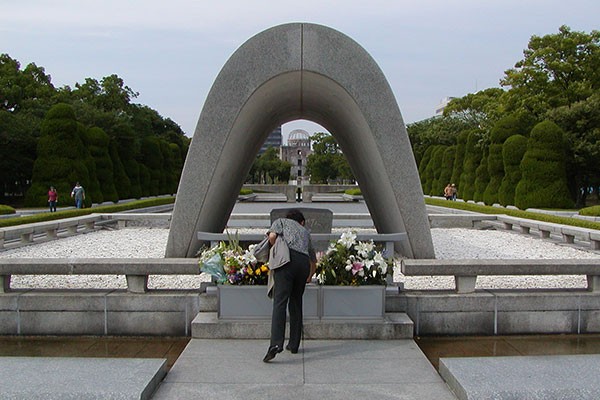A remembrance ceremony has been held at the Hiroshima Peace Memorial Park to mark the 70th anniversary of the US bombing of the Japanese city of Hiroshima. Political leaders, survivors of the attacks and Hiroshima locals attended the ceremony.
At the ceremony, Japanese Prime Minister Shinzo Abe spoke about the dangers of nuclear weapons, and renewed a vow to end their use.
Abe said that as the only country that has been victim to a nuclear attack, Japan “has an obligation to realise a world without nuclear weapons”.
Abe also called for world leaders to further recognise the devastating impact of nuclear devices. “President Obama and other policymakers, please come to the A-bombed cities, hear the hibakusha (surviving victims) with your own ears, and encounter the reality of the atomic bombings.”
Hiroshima’s mayor, Kazumi Matsui, accused “selfish” nuclear powers, such as the US, of standing in the way of the abolishment of nuclear weapons.
Abe, Matsui and other dignitaries placed wreaths in front of an eternal flame, where a placard reads: “Rest in peace. We will not make the same mistake again.” A minute of silence was then held, with its end signified by the ringing of a temple gong.
In 1945, the city was devastated by the US deployment of an atomic bomb; the blast halved the area’s population.
It is estimated that 90,000–146,000 people were killed in the attack, which involved US use of a uranium bomb nicknamed “Little Boy”. A few days after, a similar bomb was dropped in Nagasaki. These are the only two occasions when nuclear weapons have been used for warfare.
Following the bombings, many people died from radiation sickness and other injuries, combined with the effects of illness and malnutrition prevalent at the time.
In both the Hiroshima and Nagasaki bombings, most of those who died were civilians, with only around 20,000 of the casualties in Hiroshima being military.
The bombings were spurred by Japan’s refusal to make an unconditional surrender in the final year of World War II.
The US, the United Kingdom and China gave Japan the option of surrendering, threatening Japan with “prompt and utter destruction” if the country did not accept.
On 15 August 1945, just days after the bombing, Japan announced its surrender to the Allied forces.
Soon after, on 2 September 1945, World War II ended, with Japan’s surrender in many ways securing the Allies’ victory.







